Download PDF Here
Live Encounters Magazine April 2023
We, The Ocean by José Truda Palazzo, Jr.

Credit: Chino Loria/Phantom Divers.
The gauge marked 50 bar, ¼ of the air cylinder’s original pressure, which meant it was time to slowly make it to the surface. A few hundred meters from the beach at Playa del Carmen, in the crystal-clear waters of Mexico’s Pacific coast, the group of divers, me included, rise as one as instructed by the guides. Still mesmerized by the experience, we all look down during our ascent and watch the dozen or so adult female bull sharks circling around.
We had just spent a good half hour with them, watching our experienced Phantom Divers guides feed the three-meter-long bulky animals, who swam around and looked at us with eyes which expressed curiosity, not aggressiveness. I soon emerged from the sea, but it didn’t leave me; the salty solutions running through our body are a permanent reminder that we all came from it, in the deep time of the amazing journey called evolution.
It’s been almost 45 years now since I embarked on a lifetime of defending the oceans – rather, the Ocean, this single all-encircling body of living water that’s the defining feature of our planet. It was 1978 and countries around the world were killing whales by the tens of thousands, an almost 400-year long slaughter which brought most species of these magnificent animals to the brink of extinction.
But whaling was only the most scandalous of Ocean-maiming activities undertaken by humankind, enough to rally citizens from around the world (including me) to demand an end to their massacre. And it worked: nowadays commercial whaling is banned in all but three countries and in the high seas, and most whale species are on a safe path to full recovery. But as I said, this was only the most visible aggression against the Ocean – the proverbial tip of the iceberg, and there was much more below the water line.
As people were fighting to end whaling, more pervasive threats continued to escalate against the living salt waters of our planet. Nowadays climate change is the über-rallying cry, and governments and corporations alike, with varying degrees of honesty, tout their efforts to mitigate, reverse, or otherwise contain it against an ever-growing curve of carbon dioxide in the atmosphere – and the Ocean.
But an equally disastrous event has been happening for decades under our collective noses without any proportional reaction: overfishing. In the last five decades alone, humankind has doubled its consumption of what we conveniently dubbed “seafood”, but which in fact are thousands of species of marine wildlife, each with a role in the grand ecological web of the Ocean, and most of them with life cycles that we don’t actually understand enough to manage sustainably. Currently we are consuming more than 150 million tons of marine wildlife a year. Most of it comes from unsustainable operations that are rapidly depleting these species, as scientific studies repeatedly published have warned, yet to no avail.
But the direct consumption of marine wildlife as food is only part of the problem; the way it is caught makes this, the last great hunter-gatherer activity of humans, also the most wasteful use of any natural resource on Earth.

From coastal gillnets that drown endangered dolphins by the dozen to longlines that cover thousands of miles every day in the high seas killing sea turtles, sharks and albatrosses; from the indecent but widespread practice of bottom-trawling, which entirely destroys the seabed and its living communities of corals, sponges, mollusks with a weighted net to the shrimp fisheries which “discard” (that is, kill and throw overboard) up to 80% of its total catch composed of other species of living beings, we have all tacitly allowed the primitiveness of the Paleolithic hunter, who burnt entire forests to eat some deer, to survive into the 21st century in a different kind of arsonism.
I mentioned the Ocean as living waters a little while before. It is no metaphor; every drop of sea water in existence is filled with innumerable living creatures which compose the plankton, the wondrous basis of all life on our planet. I was first introduced to these marvelous creatures while looking through a microscope in a time when there was no internet, but you can check them online now, and I doubt you wouldn’t be mesmerized by their beauty.
From minute crab larvae to the geometrical forms of the diatom silica shells, a whole universe in a drop hints at the immensity of the living exchanges and relations that exist in the Ocean and about which we never pause long enough to reflect upon. And yet we should. More than 50% and probably up to 80% of the oxygen we breathe is produced by marine algae like those hiding in that water drop. And an enormous amount of the carbon we keep spewing in the atmosphere is absorbed by the Ocean.
But guess what? It can’t do it without healthy populations of whales – or fish and other myriad animals that roam the blue vastness. Recent studies are proving that the existence of robust biomass in the Ocean, in the form of marine wildlife of all kinds, is essential for the absorption and retention of carbon in the marine ecosystems. If we continue to extract marine wildlife – “seafood” – from the Ocean at current levels, no effort will suffice to mitigate the climate crisis.
I have so far led you through a (somewhat depressing) story centered on the utilitarian view of the Ocean by humankind and its consequences. It is true that reversing the current decline in marine wildlife would serve us well; however, it would be a pity if we only thought of saving it due to egotistic reasons. There’s so much more to the Ocean that can enrich our lives than considering its inhabitants as “seafood”! And one needs to go no further than listening to a talk by Her Deepness Dr. Sylvia Earle, the most acclaimed female underwater explorer of all time, to find reasons beyond our self-interest to do something to protect the seas.
Sylvia’s vivid depictions of fish lives and characters, observed during her hundreds of hours of SCUBA diving, come as no surprise to fellow divers like me, but certainly raises eyebrows among the general public, so used to think of fish as some inanimate thing on a dinner plate, devoid of intelligence and feelings. Fish do feel pain, but they also feel the world around them in other ways, and live complex lives in their multidimensional environment. So do octopuses and cuttlefish, not to speak of our acquaintances, the marine mammals. But even those very simple organisms in the drop of sea water live a complex existence and hold a key place in this immense symphony of life, this endless source of marvel.

Starting to realize that the Ocean deserves not only to be conserved as a repository of “goods” for humans have important implications from an ethical standpoint, leading us to challenge the conventional views on marine conservation and “sustainable use”.
Ghanaian scientist Dr. Rashid Sumaila, one of the world’s leading authorities on fisheries and overfishing, challenged the conventional beliefs around “food security” at the recent United Nations Ocean Conference, by stating that we should start caring about the food security for sharks, whales, seabirds – in essence, abandon our greedy grabbing of marine wildlife even if it’s deemed “sustainable” from a catch level standpoint, and begin to think about leaving enough fish and other wildlife in the Ocean so the great and interconnected marine food webs can function properly, so that no albatross or penguin chick will die of hunger in a remote subantarctic island because its parents, having traversed hundreds of miles of sea, couldn’t find enough to feed it.
We must start working not only to restore fish and other marine wildlife populations to a “sustainable harvest” level, but to a point where all these interactions can continue to happen adequately. We must restore the health of the Ocean as a whole.
Should we stop fishing? The answer is, simply, yes, most of it. Industrial fishing must be banned from the high seas immediately – it is unduly subsidized, highly destructive, and oftentimes controlled by veritable mafias which regularly resort to slavery and rampant corruption to keep their murderous business afloat. National industrial fishing fleets should be gradually retired. And artisanal fishing, practiced by coastal communities, must be brought to exist under sustainable levels and practices, with full financial support from the billions that are currently being spent in paying industrial fishing to destroy everything. Eventually, if we want to have a healthy Ocean that serves us through its many planetary ecosystem services, most fishing must end.
But what will the billions of people depending on “seafood” eat? The answer lies in a combination of carefully managed artisanal fishing, aquaculture, and the emerging industry of tissue cultivation, which already produces acceptable “seafood” products that can replace wild-caught ones.
Besides being helped, as they deserve, into truly sustainable artisanal fishing, there are other ways through which coastal communities can benefit from restoring Ocean health. Fishermen around the world are partially or fully replacing extractive activities for non-extractive ones, earning much more from Marine Ecotourism, and with that not only improving their own lives, but opening a window of awareness for millions of people about the beauty and importance of the Ocean. These activities, diving, whale and shark watching, or simply contemplating the watery realm in its grandeur, are an essential part of our effort to restore our ancestral links to it.
A sense of intimacy, of belonging, a rapport, a bond. Something hard to define but which will make you question where your next “seafood”- marine wildlife – plate came from, and how much it costs the planet. Which will make you ask your politicians why your tax money is being given to fund destroyers of the marine world. Which will, hopefully, make you think whether offshore oil extraction or deep-sea mining are acceptable at all, this late in the climate emergency.
And make you ACT upon all those things with the immense power of citizenship we all carry.
And, in the end, will make you long for the sight of the blue horizons, make you feel rewarded by knowing there are still sharks and whales, corals and diatoms, albatrosses and turtles out there, and ultimately feel one with the Ocean, our mother, our kin.

© José Truda Palazzo, Jr.
José Truda Palazzo, Jr. is a Brazilian environmentalist, wildlife gardener and writer with a career spanning 45 years and 14 books published as author or co-author. An avid SCUBA diver, he has been mingling with marine wildlife in 11 countries around the world.
He served for almost two decades in government delegations to international marine conservation treaties and is a co-founder of many conservation organizations around Brazil and South America. A member of the IUCN (World Conservation Union) Task Force on Marine Mammals and Protected Areas and its Tourism and Protected Areas Specialist Group, a Life Member of the Australian Conservation Foundation, and a Board Member of the Brazilian Humpback Whale Institute, he also serves as Senior Conservation Officer for IBRACON, the Brazilian Institute for Nature Conservation.
His next book, Living Water: Marine Ecotourism, Communities and Conservation will be published in 2023 by Australian publishing house Stormbird Press. More about his work and writings at https://www.josetruda.wordpress.com/. E-mail: josepalazzo@gmail.com



I really enjoyed reading this article! Completely agree with the need of ending overfishing and changing our perspective of the ocean as the place where seafood live. Thank you very much for all your work José!